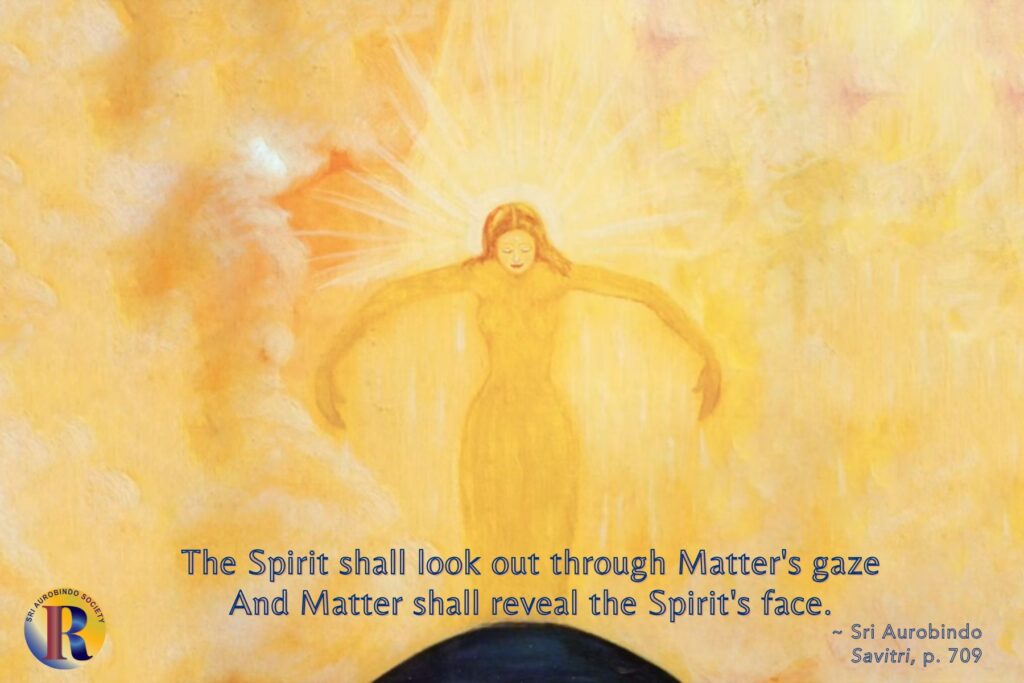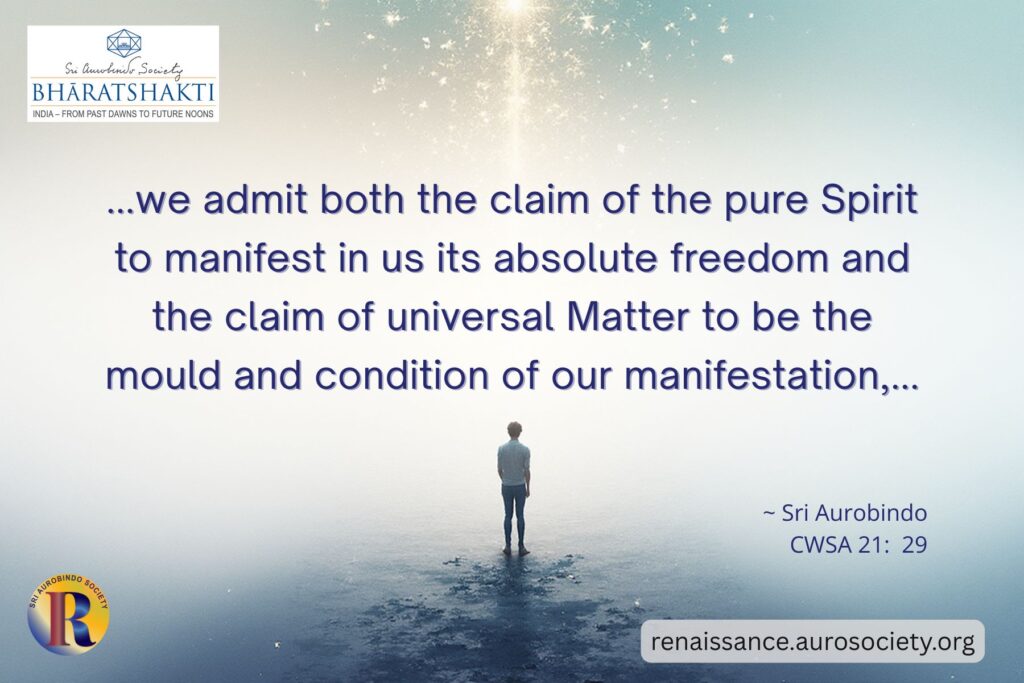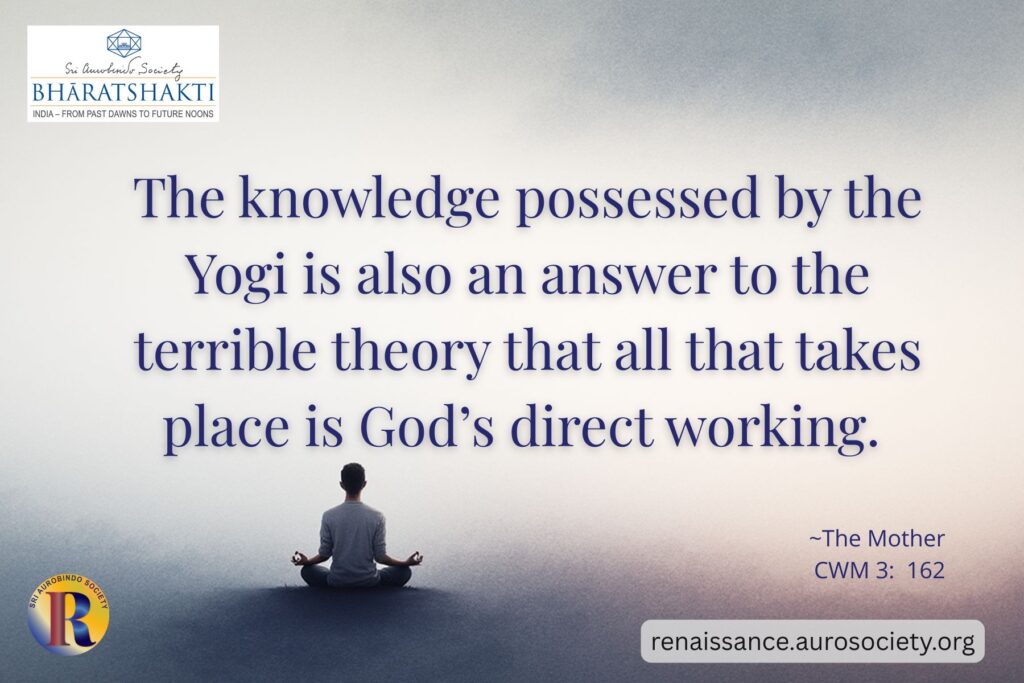Editor’s note: We feature here some selections from two chapters of Sri Aurobindo’s The Synthesis of Yoga where he gives a detailed description of what is common and what is different between popular religion and Yoga of Devotion. An interesting analysis is also presented of how fear of God does not find any place in true Bhakti or devotion.
We have made a few formatting revisions for the purpose of digital presentation. No alteration has been made in the original text.

All religion begins with the conception of some Power or existence greater and higher than our limited and mortal selves, a thought and act of worship done to that Power, and an obedience offered to its will, its laws or its demands. But Religion, in its beginnings, sets an immeasurable gulf between the Power thus conceived, worshipped and obeyed and the worshipper.
Yoga in its culmination abolishes the gulf; for Yoga is union.
We arrive at union with it through knowledge; for as our first obscure conceptions of it clarify, enlarge, deepen, we come to recognise it as our own highest self, the origin and sustainer of our being and that towards which it tends.
We arrive at union with it through works; for from simply obeying we come to identify our will with its Will, since only in proportion as it is identified with this Power that is its source and ideal, can our will become perfect and divine.
We arrive at union with it also by worship; for the thought and act of a distant worship develops into the necessity of close adoration and this into the intimacy of love, and the consummation of love is union with the Beloved. . .
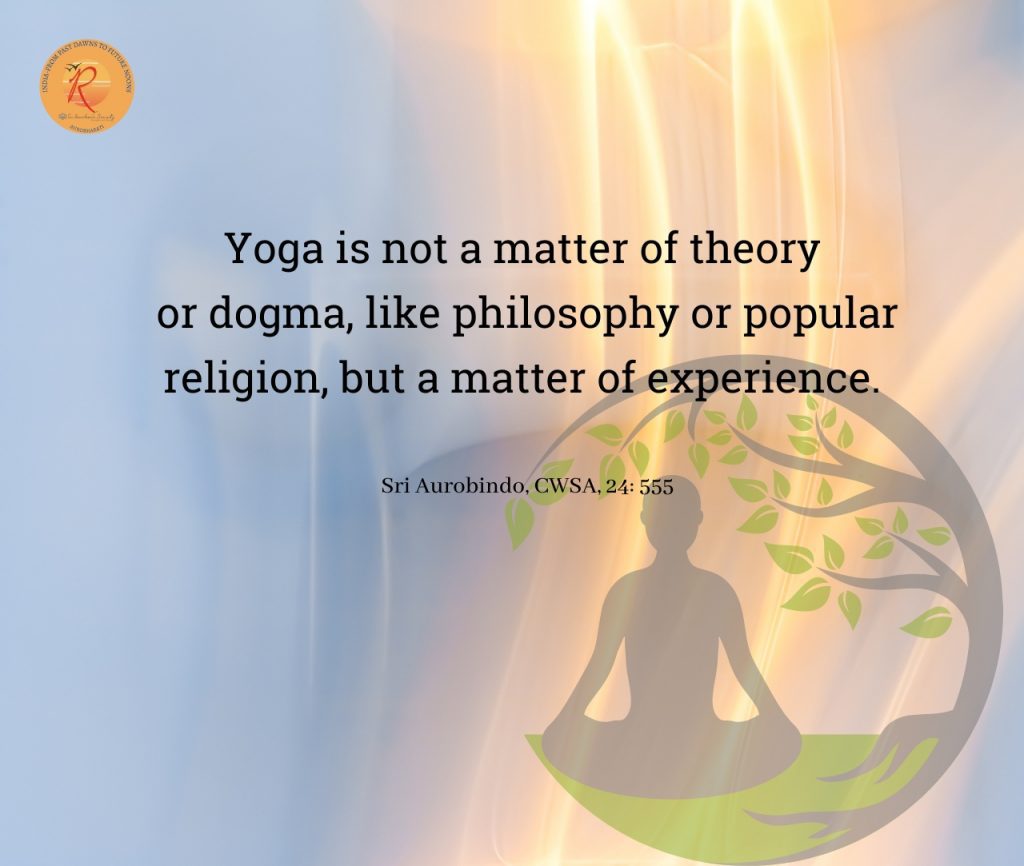
Yoga Proceeds by Conscious Union
The ground on which sceptical unbelief assails Religion, namely, that there is in fact no conscient Power or Being in the universe greater and higher than ourselves or in any way influencing or controlling our existence, is one which Yoga cannot accept, as that would contradict all spiritual experience and make Yoga itself impossible.
Yoga is not a matter of theory or dogma, like philosophy or popular religion, but a matter of experience.
Its experience is that of a conscient universal and supracosmic Being with whom it brings us into union, and this conscious experience of union with the Invisible, always renewable and verifiable, is as valid as our conscious experience of a physical world and of visible bodies with whose invisible minds we daily communicate. Yoga proceeds by conscious union, the conscious being is its instrument, and a conscious union with the Inconscient cannot be. . .
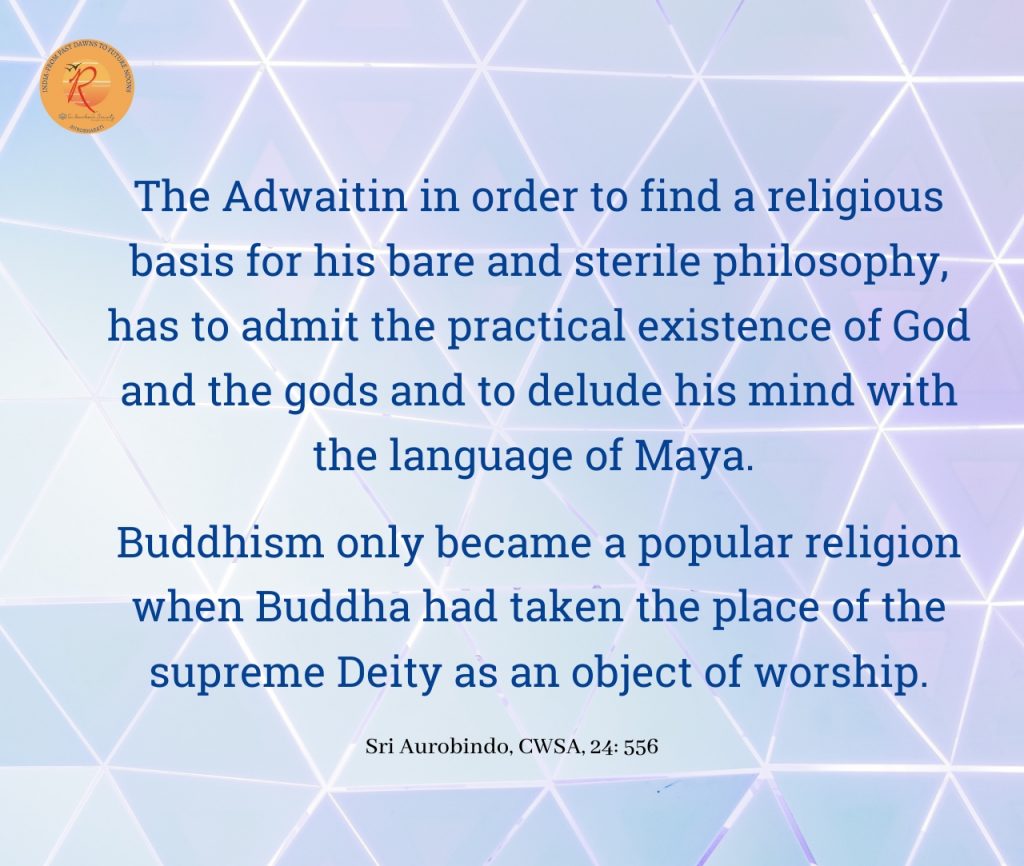
Religion and Yoga of Devotion
. . . Religion and the Yoga of Bhakti go farther; they attribute to this Being a Personality and human relations with the human being.
In both the human being approaches the Divine by means of his humanity, with human emotions, as he would approach a fellow-being, but with more intense and exalted feelings; and not only so, but the Divine also responds in a manner answering to these emotions. In that possibility of response lies the whole question; for if the Divine is impersonal, featureless and relationless, no such response is possible and all human approach to it becomes an absurdity; we must rather dehumanise, depersonalise, annul ourselves in so far as we are human beings or any kind of beings; on no other conditions and by no other means can we approach it.
Love, fear, prayer, praise, worship of an Impersonality which has no relation with us or with anything in the universe and no feature that our minds can lay hold of, are obviously an irrational foolishness. On such terms religion and devotion become out of the question.
The Adwaitin in order to find a religious basis for his bare and sterile philosophy, has to admit the practical existence of God and the gods and to delude his mind with the language of Maya. Buddhism only became a popular religion when Buddha had taken the place of the supreme Deity as an object of worship.
~ Sri Aurobindo, CWSA, Vol. 24, pp. 552-556
Fear of God or Love of God?
All the feelings with which religion approaches the worship, service and love of God, the Yoga [of Devotion] admits, if not as its final accompaniments, yet as preparatory movements of the emotional nature. But there is one feeling with which the Yoga, at least as practised in India, has very little dealing.
In certain religions, in most perhaps, the idea of the fear of God plays a very large part, sometimes the largest, and the God-fearing man is the typical worshipper of these religions.
The sentiment of fear is indeed perfectly consistent with devotion of a certain kind and up to a certain point; at its highest it rises into a worship of the divine Power, the divine Justice, divine Law, divine Righteousness, and ethical obedience, an awed reverence for the almighty Creator and Judge.
Its motive is therefore ethico-religious and it belongs not so strictly to the devotee, but to the man of works moved by a devotion to the divine ordainer and judge of his works. It regards God as the King and does not approach too near the glory of his throne unless justified by righteousness or led there by a mediator who will turn away the divine wrath for sin.
Even when it draws nearest, it keeps an awed distance between itself and the high object of its worship.
It cannot embrace the Divine with all the fearless confidence of the child in his mother or of the lover in his beloved or with that intimate sense of oneness which perfect love brings with it.
The origin of this divine fear was crude enough in some of the primitive popular religions. It was the perception of powers in the world greater than man, obscure in their nature and workings, which seemed always ready to strike him down in his prosperity and to smite him for any actions which displeased them.
Crude and Imperfect Idea of the Divine
Fear of the gods arose from man’s ignorance of God and his ignorance of the laws that govern the world.
It attributed to the higher powers caprice and human passion; it made them in the image of the great ones of the earth, capable of whim, tyranny, personal enmity, jealous of any greatness in man which might raise him above the littleness of terrestrial nature and bring him too near to the divine nature.
With such notions no real devotion could arise, except that doubtful kind which the weaker may feel for the stronger whose protection he can buy by worship and gifts and propitiation and obedience to such laws as he may have laid upon those beneath him and may enforce by rewards and punishments, or else the submissive and prostrate reverence and adoration which one may feel for a greatness, glory, wisdom, sovereign power which is above the world and is the source or at any rate the regulator of all its laws and happenings.
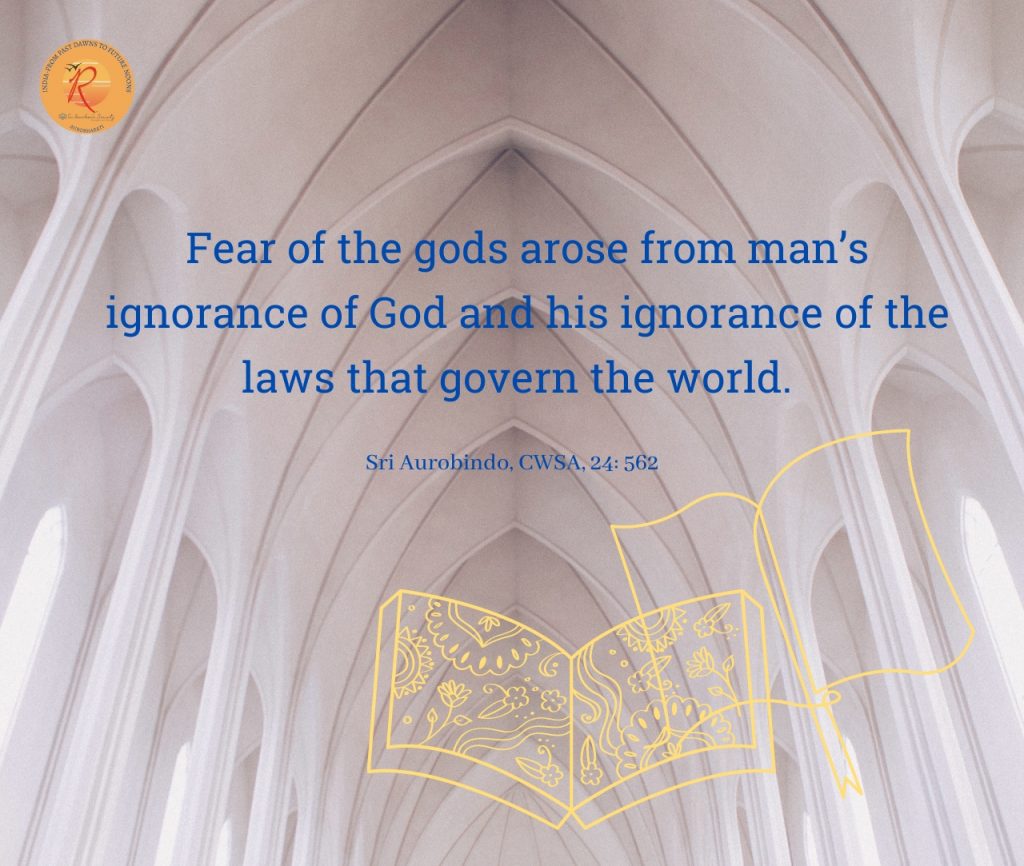
A nearer approach to the beginnings of the way of devotion becomes possible when this element of divine Power disengages itself from these crudities and fixes on the idea of a divine ruler, creator of the world and master of the Law who governs the earth and heavens and is the guide and helper and saviour of his creatures.
This larger and higher idea of the divine Being long kept many elements and still keeps some elements of the old crudity. The Jews who brought it forward most prominently and from whom it overspread a great part of the world, could believe in a God of righteousness who was exclusive, arbitrary, wrathful, jealous, often cruel and even wantonly sanguinary.
Even now it is possible for some to believe in a Creator who has made heaven and hell, an eternal hell, the two poles of his creation, and has even according to some religions predestined the souls he has created not only to sin and punishment, but to an eternal damnation.
But even apart from these extravagances of a childish religious belief, the idea of the almighty Judge, Legislator, King, is a crude and imperfect idea of the Divine, when taken by itself, because it takes an inferior and an external truth for the main truth and it tends to prevent a higher approach to a more intimate reality.
It exaggerates the importance of the sense of sin and thereby prolongs and increases the soul’s fear and self-distrust and weakness. It attaches the pursuit of virtue and the shunning of sin to the idea of rewards and punishment, though given in an after life, and makes them dependent on the lower motives of fear and interest instead of the higher spirit which should govern the ethical being. It makes hell and heaven and not the Divine himself the object of the human soul in its religious living.
These crudities have served their turn in the slow education of the human mind, but they are of no utility to the Yogin who knows that whatever truth they may represent belongs rather to the external relations of the developing human soul with the external law of the universe than any intimate truth of the inner relations of the human soul with the Divine; but it is these which are the proper field of Yoga.
Still out of this conception there arise certain developments which bring us nearer to the threshold of the Yoga of devotion.
Divine as the Highest Self and Spirit
First, there can emerge the idea of the Divine as the source and law and aim of our ethical being and from this there can come the knowledge of him as the highest Self to which our active nature aspires, the Will to which we have to assimilate our will, the eternal Right and Purity and Truth and Wisdom into harmony with which our nature has to grow and towards whose being our being is attracted.
By this way we arrive at the Yoga of works, and this Yoga has a place for personal devotion to the Divine, for the divine Will appears as the Master of our works to whose voice we must listen, whose divine impulsion we must obey and whose work it is the sole business of our active life and will to do.
Secondly, there emerges the idea of the divine Spirit, the father of all who extends his wings of benignant protection and love over all his creatures, and from that grows between the soul and the Divine the relation of father and child, a relation of love, and as a result the relation of brotherhood with our fellow-beings.
These relations of the Divine into the calm pure light of whose nature we have to grow and the Master whom we approach through works and service, the Father who responds to the love of the soul that approaches him as the child, are admitted elements of the Yoga of devotion.
The moment we come well into these developments and their deeper spiritual meaning, the motive of the fear of God becomes otiose, superfluous and even impossible. It is of importance chiefly in the ethical field when the soul has not yet grown sufficiently to follow good for its own sake and needs an authority above it whose wrath or whose stern passionless judgment it can fear and found upon that fear its fidelity to virtue.
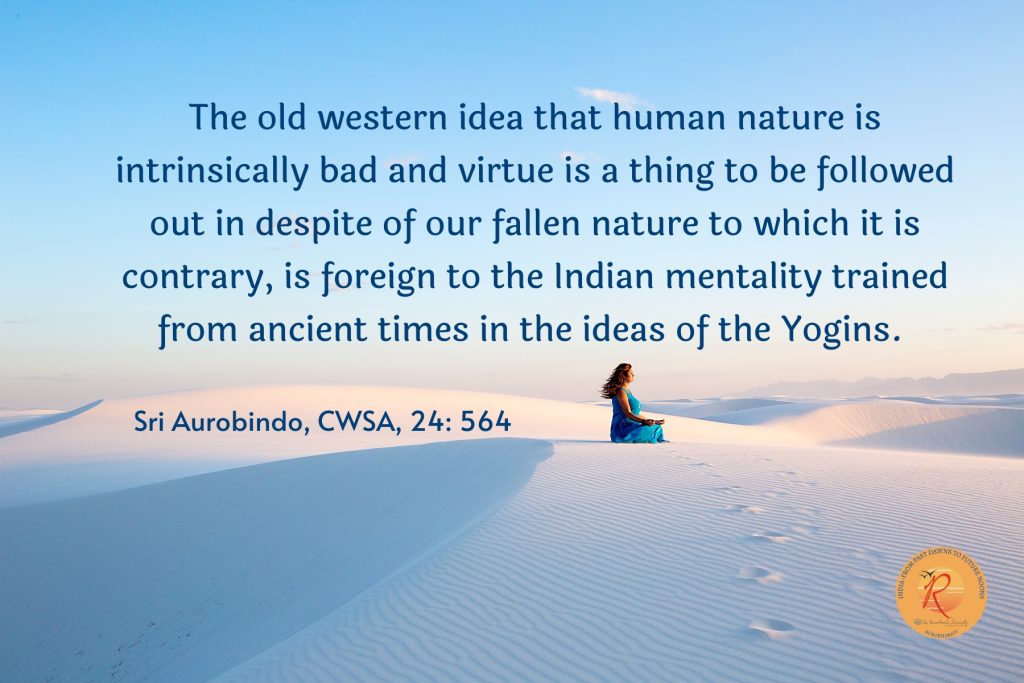
Fear has No Place in Yoga of Devotion
When we grow into spirituality, this motive can no longer remain except by the lingering on of some confusion in the mind, some persistence of the old mentality.
Moreover, the ethical aim in Yoga is different from that of the external idea of virtue. Ordinarily, ethics is regarded as a sort of machinery of right action, the act is everything and how to do the right act is the whole question and the whole trouble. But to the Yogin action is chiefly important not for its own sake, but rather as a means for the growth of the soul God-ward.
Therefore what Indian spiritual writings lay stress upon is not so much the quality of the action to be done as the quality of the soul from which the action flows, upon its truth, fearlessness, purity, love, compassion, benevolence, absence of the will to hurt, and upon the actions as their out-flowings.
The old western idea that human nature is intrinsically bad and virtue is a thing to be followed out in despite of our fallen nature to which it is contrary, is foreign to the Indian mentality trained from ancient times in the ideas of the Yogins. Our nature contains, as well as its passionate rajasic and its downward-tending tamasic quality, a purer sattwic element and it is the encouragement of this, its highest part, which is the business of ethics. By it we increase the divine nature, daivī prakṛti, which is present in us and get rid of the Titanic and demoniac elements.
Not therefore the Hebraic righteousness of the God-fearing man, but the purity, love, beneficence, truth, fearlessness, harmlessness of the saint and the God-lover are the goal of the ethical growth according to this notion.
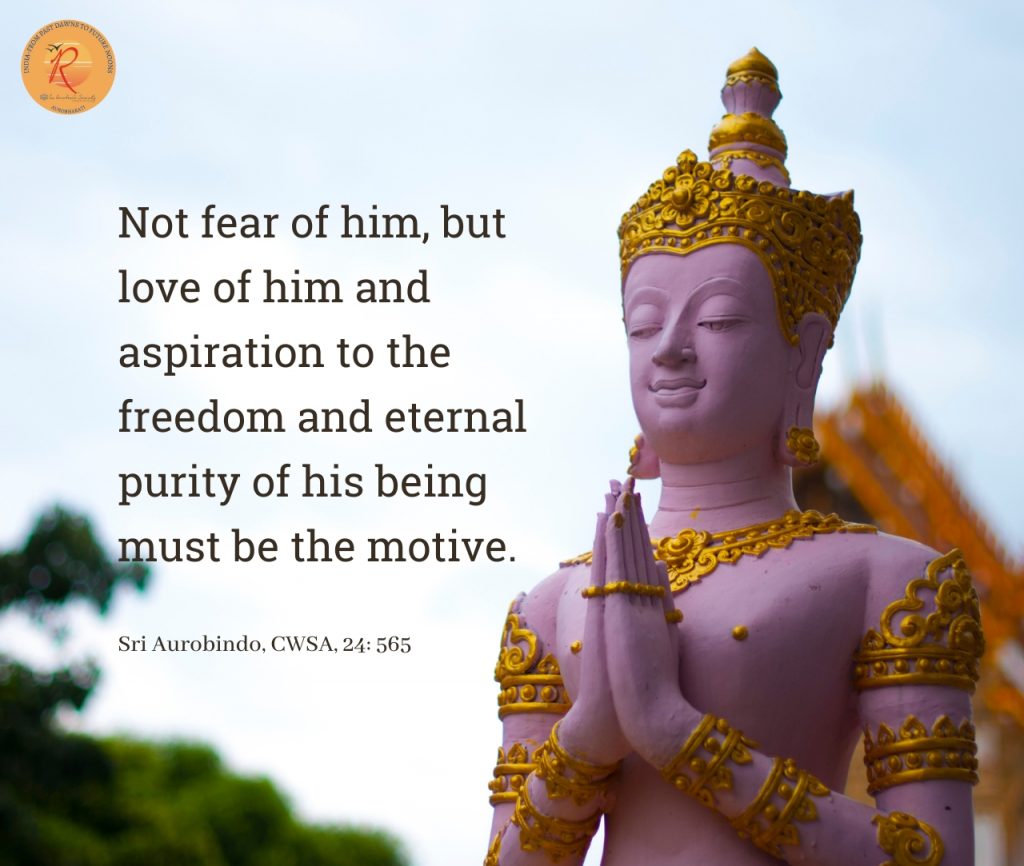
And, speaking more largely, to grow into the divine nature is the consummation of the ethical being. This can be done best by realising God as the higher Self, the guiding and uplifting Will or the Master whom we love and serve.
Not fear of him, but love of him and aspiration to the freedom and eternal purity of his being must be the motive.
~ Sri Aurobindo, CWSA, Vol. 24, pp. 561-565

